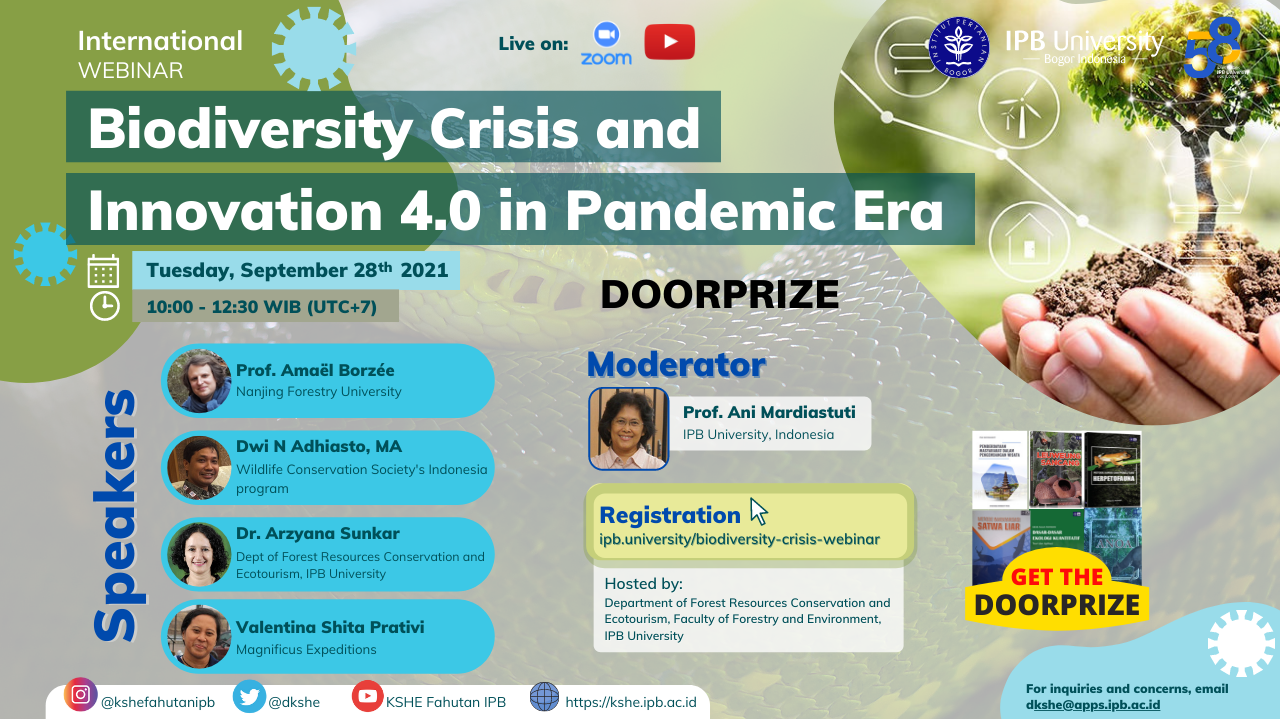Coming Virtual Event: International Webinar
“Biodiversity Crisis and Innovation 4.0 in Pandemic Era”
Biodiversity underpins current and future human health, well-being and economic prosperity. Yet, it is being destroyed at an unprecedented and accelerating rate, with 25% of all plant and animal species now threatened with extinction. Now, the world faces its sixth mass extinction event, with one million plant and animal species now threatened with extinction due to changes in land and sea-use, overexploitation, climate change, pollution and invasive alien species (Diaz et al. 2019).
The COVID-19 pandemic has brought profound social, political, economic, and environmental and biodiversity challenges to the world. The sudden rapid outbreak of the disease, short timeframe since the commencement of the lockdown, and inaccessibility to field sites to start new empirical studies and monitor ongoing studies have in the absence of scientific evidence of direct impacts of the lockdown on species and ecosystems of concern. As a result, much of the direct environmental impact of the lockdown is still anecdotal. In the last two years after the first case of COVID-19, biodiversity conservation development projects requiring a mandatory human presence, such as surveillance of protected areas, treatments of diseases of wild plants and animals, and eradication of invasive alien species, may take a backseat. Without protection and added anthropogenic pressures due to the mass migration and unemployment in the biodiversity-rich developing world, the species and habitats of concern may be in danger of hunting, poaching, mining, logging, and diseases.
On the other hand, the lockdown has seen an upsurge in virtual citizen science projects (Darby 2020). Such collaborations between the researchers and the general public in digitization, preliminary data gathering, and volunteering are likely to underscore the role of citizens in biodiversity conservation projects. As the coronavirus (Covid-19) pandemic spreads, innovation 4.0, such as technological applications and initiatives, are multiplying to control the situation. Therefore, we must integrate innovation 4.0 and biodiversity considerations into their COVID-19 response. Now, many countries have integrated biodiversity measures in their COVID-19 policy response. The essential links between human health and well-being, biodiversity, and climate change could inspire a new generation of innovators to provide green solutions to enable humans to live in a healthy balance with nature, leading to a long-term resilient future.
This international webinar will be held online in a focused discussion facilitated by the Department of Forest Resources Conservation and Ecotourism, Faculty of Forestry and Environment, IPB University. The parties will actively provide material and opinions both in writing and orally.
The international webinar will involve speakers from universities, research institutions, non-governmental organizations and practitioners with various fields related to the theme:
- Prof. Amaël Borzée from Nanjing Forestry University, China
- Dwi N Adhiasto, MA from Wildlife Conservation Society’s Indonesia program, Indonesia
- Dr. Arzyana Sunkar from Departement of Forest Resources Conservation and Ecotourism, Faculty of Forestry and Environment, IPB University, Indonesia
- Valentina Shita Prativi from Magnificus Expeditions, Indonesia
The international webinar will be held online using the Zoom platform on:
Day/date : Tuesday, 28 September 2021
Time : 10.00-12.30 WIB
The purpose of holding this activity is intended as a form of communication and an effort to spread to the wide community about the current biodiversity crisis and how innovation 4.0 is used to overcome this crisis, especially during the pandemic era. Let’s join us: ipb.university/biodiversity-crisis-webinar.
Syafitri Hidayati

